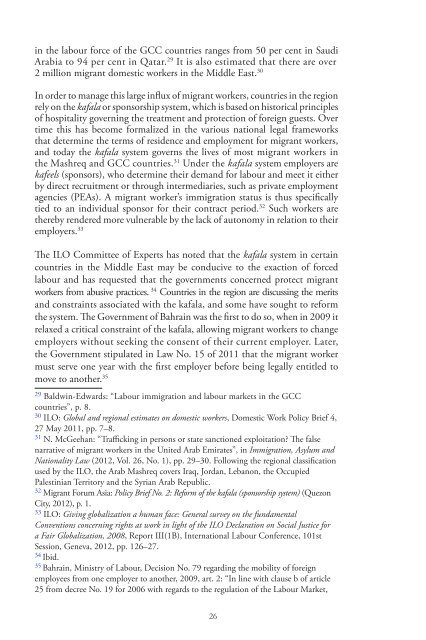Tricked and Trapped: Human Trafficking in the Middle East, ‎pdf 4.1 MB
Tricked and Trapped: Human Trafficking in the Middle East, ‎pdf 4.1 MB
Tricked and Trapped: Human Trafficking in the Middle East, ‎pdf 4.1 MB
Create successful ePaper yourself
Turn your PDF publications into a flip-book with our unique Google optimized e-Paper software.
<strong>in</strong> <strong>the</strong> labour force of <strong>the</strong> GCC countries ranges from 50 per cent <strong>in</strong> Saudi<br />
Arabia to 94 per cent <strong>in</strong> Qatar. 29 It is also estimated that <strong>the</strong>re are over<br />
2 million migrant domestic workers <strong>in</strong> <strong>the</strong> <strong>Middle</strong> <strong>East</strong>. 30<br />
In order to manage this large <strong>in</strong>flux of migrant workers, countries <strong>in</strong> <strong>the</strong> region<br />
rely on <strong>the</strong> kafala or sponsorship system, which is based on historical pr<strong>in</strong>ciples<br />
of hospitality govern<strong>in</strong>g <strong>the</strong> treatment <strong>and</strong> protection of foreign guests. Over<br />
time this has become formalized <strong>in</strong> <strong>the</strong> various national legal frameworks<br />
that determ<strong>in</strong>e <strong>the</strong> terms of residence <strong>and</strong> employment for migrant workers,<br />
<strong>and</strong> today <strong>the</strong> kafala system governs <strong>the</strong> lives of most migrant workers <strong>in</strong><br />
<strong>the</strong> Mashreq <strong>and</strong> GCC countries. 31 Under <strong>the</strong> kafala system employers are<br />
kafeels (sponsors), who determ<strong>in</strong>e <strong>the</strong>ir dem<strong>and</strong> for labour <strong>and</strong> meet it ei<strong>the</strong>r<br />
by direct recruitment or through <strong>in</strong>termediaries, such as private employment<br />
agencies (PEAs). A migrant worker’s immigration status is thus specifically<br />
tied to an <strong>in</strong>dividual sponsor for <strong>the</strong>ir contract period. 32 Such workers are<br />
<strong>the</strong>reby rendered more vulnerable by <strong>the</strong> lack of autonomy <strong>in</strong> relation to <strong>the</strong>ir<br />
employers. 33<br />
The ILO Committee of Experts has noted that <strong>the</strong> kafala system <strong>in</strong> certa<strong>in</strong><br />
countries <strong>in</strong> <strong>the</strong> <strong>Middle</strong> <strong>East</strong> may be conducive to <strong>the</strong> exaction of forced<br />
labour <strong>and</strong> has requested that <strong>the</strong> governments concerned protect migrant<br />
workers from abusive practices. 34 Countries <strong>in</strong> <strong>the</strong> region are discuss<strong>in</strong>g <strong>the</strong> merits<br />
<strong>and</strong> constra<strong>in</strong>ts associated with <strong>the</strong> kafala, <strong>and</strong> some have sought to reform<br />
<strong>the</strong> system. The Government of Bahra<strong>in</strong> was <strong>the</strong> first to do so, when <strong>in</strong> 2009 it<br />
relaxed a critical constra<strong>in</strong>t of <strong>the</strong> kafala, allow<strong>in</strong>g migrant workers to change<br />
employers without seek<strong>in</strong>g <strong>the</strong> consent of <strong>the</strong>ir current employer. Later,<br />
<strong>the</strong> Government stipulated <strong>in</strong> Law No. 15 of 2011 that <strong>the</strong> migrant worker<br />
must serve one year with <strong>the</strong> first employer before be<strong>in</strong>g legally entitled to<br />
move to ano<strong>the</strong>r. 35<br />
29<br />
Baldw<strong>in</strong>-Edwards: “Labour immigration <strong>and</strong> labour markets <strong>in</strong> <strong>the</strong> GCC<br />
countries”, p. 8.<br />
30<br />
ILO: Global <strong>and</strong> regional estimates on domestic workers, Domestic Work Policy Brief 4,<br />
27 May 2011, pp. 7–8.<br />
31<br />
N. McGeehan: “<strong>Traffick<strong>in</strong>g</strong> <strong>in</strong> persons or state sanctioned exploitation? The false<br />
narrative of migrant workers <strong>in</strong> <strong>the</strong> United Arab Emirates”, <strong>in</strong> Immigration, Asylum <strong>and</strong><br />
Nationality Law (2012, Vol. 26, No. 1), pp. 29–30. Follow<strong>in</strong>g <strong>the</strong> regional classification<br />
used by <strong>the</strong> ILO, <strong>the</strong> Arab Mashreq covers Iraq, Jordan, Lebanon, <strong>the</strong> Occupied<br />
Palest<strong>in</strong>ian Territory <strong>and</strong> <strong>the</strong> Syrian Arab Republic.<br />
32<br />
Migrant Forum Asia: Policy Brief No. 2: Reform of <strong>the</strong> kafala (sponsorship system) (Quezon<br />
City, 2012), p. 1.<br />
33<br />
ILO: Giv<strong>in</strong>g globalization a human face: General survey on <strong>the</strong> fundamental<br />
Conventions concern<strong>in</strong>g rights at work <strong>in</strong> light of <strong>the</strong> ILO Declaration on Social Justice for<br />
a Fair Globalization, 2008, Report III(1B), International Labour Conference, 101st<br />
Session, Geneva, 2012, pp. 126–27.<br />
34<br />
Ibid.<br />
35<br />
Bahra<strong>in</strong>, M<strong>in</strong>istry of Labour, Decision No. 79 regard<strong>in</strong>g <strong>the</strong> mobility of foreign<br />
employees from one employer to ano<strong>the</strong>r, 2009, art. 2: “In l<strong>in</strong>e with clause b of article<br />
25 from decree No. 19 for 2006 with regards to <strong>the</strong> regulation of <strong>the</strong> Labour Market,<br />
26
















